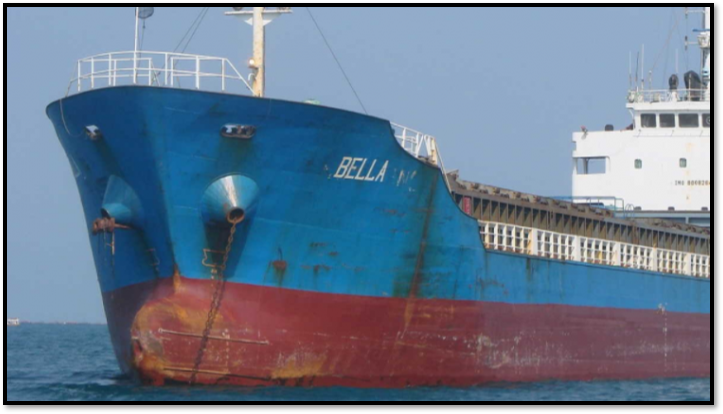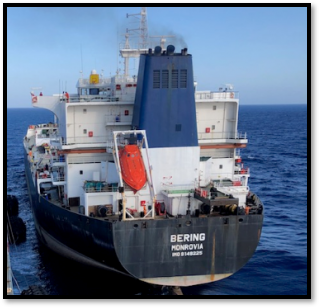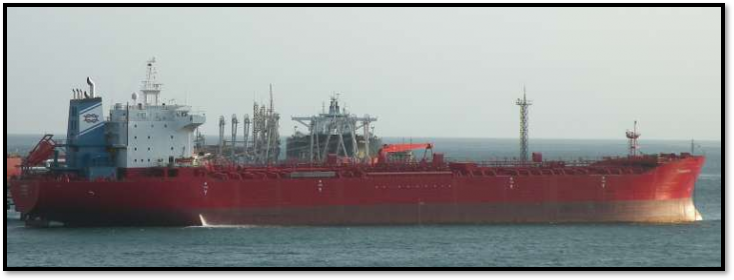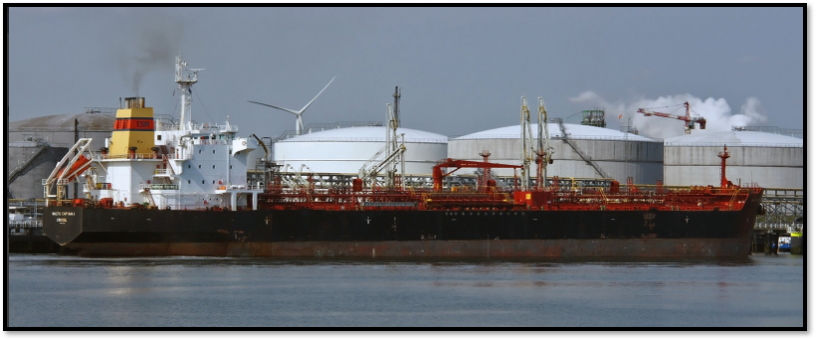On August 12, the United States took control of Iranian oil aboard four privately-owned tankers bound for energy-strapped Venezuela. The tankers, owned by a Greek shipping magnate, collectively carried 1.1 million barrels of Iranian petroleum, according to the Department of Justice. It was the largest seizure of Iranian fuel and the latest step in the U.S. “maximum pressure” campaign to squeeze Iran economically to return to the negotiating table.
The United States did not physically capture or use military force to interdict the tankers. The Greek owner, George Gialozologlou, agreed to turn over the cargo in a deal that would prevent the United States from seizing his ships or imposing sanctions on his company. The United States commissioned third party vessels to take possession of the cargo “with the assistance of foreign partners” and carry it to Houston, the DOJ said. Two of the vessels were seized in the Gulf of Oman, the other two were seized near Mozambique.
U.S. prosecutors accused the Revolutionary Guards of arranging the fuel sales from Iran to Venezuela. Iran acknowledged that the tankers were carrying Iranian fuel but claimed it had been fully paid for by Venezuela and was therefore Venezuelan property. “The cargoes were loaded from Iran, but neither the ships nor the cargoes belonged to Iran,” Oil Minister Bijan Namdar Zanganeh said. “The fuel was Iranian, but it had been sold to Venezuela and its payment had cleared.”
The four ships - the Bella, the Bering, the Pandi and the Luna - were part of a nine-ship flotilla ferrying oil to Venezuela. Five of the ships, all owned by Iran, arrived in Venezuela in May and June. The other four vessels peeled off from the flotilla in May after the U.S. threatened sanctions against the Greek owner. All four vessels were registered in Liberia but were owned by a network of companies run by Gialozoglou and his son, Marios. “We are not going to break sanctions, and we will obey the law,” Gialozoglou told Lloyd’s List, a London-based shipping newspaper, in July.
Apparently in retaliation, Iran attacked the Wila, another tanker owned by Gialozoglou sailing in the Persian Gulf, on the same day that the U.S. took control of oil on his other four tankers headed for Venezuela. Iranian personnel boarded the ship, beat the crew, and stole equipment, Vice Admiral James Malloy later told reporters. U.S. Central Command released footage of the incident, which occurred near Khor Fakkan, a port in the United Arab Emirates (U.A.E.).
On August 28, the DOJ announced it had seized control of three websites run by companies that it claimed were Revolutionary Guards fronts. The companies - Oman Fuel, Sohar Fuel and Mobin International - were registered in the Britain, Oman and the U.A.E. respectively. The three companies demanded the immediate return of the cargo and claimed the ships were not bound for Venezuela. “At the time they were seized, the Defendant Properties were destined for Trinidad for sale to customers in Peru and Colombia,” the companies wrote in a legal filing with the U.S. District Court for the District of Columbia.
Ship Profiles
The Bella

- Date built: June 2000
- Registered owner: Bella Enterprises Co.
- Care of Vienna Ltd , 8th Floor, 14, Skouze Street, 185 36 Piraeus, Greece.
- Flag: Liberia (since October 2019)
- Gross tonnage: 23,235
- Call Sign: D5VH2
- IMO number: 9208124
- Last Port Calls:
- May 1, 2020: Suez Canal, Egypt
- October 30, 2019: Suez Canal, Egypt
The Bering

- Date built: March 1998
- Registered owner: Rifia Shipping Inc
- Care of Palermo SA , 6-8, Aitolikou & Kastoros Streets, 185 45 Piraeus, Greece
- Flag: Liberia
- Gross tonnage: 27,526
- Call Sign: ELUZ3
- IMO number: 9149225
- Last Port Calls:
- May 4, 2020: Suez Canal, Egypt
- April 17, 2020: Sharjah, UAE
- April 16, 2020: Hamriya, UAE
- January 7, 2020: Fujairah, UAE
- November 24, 2019: Fujairah, UAE
- October 31, 2019: Fujairah, UAE
- October 29, 2019: Fujairah, UAE
- September 14, 2019: Hamriya, UAE
The Pandi

- Date built: July 1996
- Registered owner: Paladin Maritime Inc
- Care of Palermo SA , 6-8, Aitolikou & Kastoros Streets, 185 45 Piraeus, Greece
- Flag: Liberia
- Gross tonnage: 26,218
- Call Sign: ELTH8
- IMO number: 9105073
- Last Port Calls:
- April 29, 2020: Sharjah, UAE
- December 31, 2019: Sohar, Oman
- October 15, 2019: Al Duqm, Oman
- October 2, 2019: Hamriya, Oman
- August 31, 2019: Sohar, Oman
- August 22, 2019: Sohar, Oman
- October 18, 2019: Hamriya, UAE
The Luna

- Date built: March 2000
- Registered owner: Luna Enterprises Co
- Care of Vienna Ltd , 8th Floor, 14, Skouze Street, 185 36 Piraeus, Greece
- Flag: Liberia (since November 2011)
- Gross tonnage: 23,235
- Call Sign: D5VG7
- IMO number: 9208100
- Last Port Calls:
- May 17, 2020: Sharjah, UAE
- January 25, 2020: Suez Canal, Egypt
- January 15, 2020: Elefsis, Greece
- January 6, 2020: Novorossiysk, Russia
- November 18, 2019: Novorossiysk, Russia
Department of Justice: Largest U.S. Seizure of Iranian Fuel from Four Tankers
August 14 - The Justice Department today announced the successful disruption of a multimillion dollar fuel shipment by the Islamic Revolutionary Guard Corps (IRGC), a designated foreign terrorist organization, that was bound for Venezuela. These actions represent the government’s largest-ever seizure of fuel shipments from Iran.
On July 2, 2020, the United States filed a complaint seeking to forfeit all petroleum-product cargo aboard four foreign-flagged oil tankers, including the M/T Bella with international maritime organization (IMO) number 9208124, the M/T Bering with IMO number 9149225, the M/T Pandi with IMO number 9105073, and the M/T Luna with IMO number 9208100 (all pictured below). A seizure order for the cargo from all four vessels was issued by U.S. District Court Judge Jeb Boasberg of the U.S. District Court for the District of Columbia.
The government announced today that it has successfully executed the seizure order and confiscated the cargo from all four vessels, totaling approximately 1.116 million barrels of petroleum. With the assistance of foreign partners, this seized property is now in U.S. custody.
After enforcement of the U.S. forfeiture order, Iran’s navy forcibly boarded an unrelated ship in an apparent attempt to recover the seized petroleum, but was unsuccessful. U.S. Central Command published a video of the failed Iranian operation yesterday. See https://twitter.com/CENTCOM/status/1293678243552395264
Funds successfully forfeited with a connection to a state sponsor of terrorism may in whole or in part be directed to the United States Victims of State Sponsored Terrorism Fund (http://www.usvsst.com/) after the conclusion of the case.
A warrant for arrest and civil forfeiture complaint are merely allegations. The burden to prove forfeitability in a civil forfeiture proceeding is upon the government.
HSI’s Colorado Springs and FBI’s Minneapolis field office are investigating the case. The case is being handled by the National Security Division and the U.S. Attorney's Office for the District of Columbia. Assistant U.S Attorneys Zia M. Faruqui, Brian Hudak, and Stuart Allen, and National Security Division Trial Attorney David Lim are litigating the case, with assistance from Paralegal Specialists Elizabeth Swienc and Legal Assistant Jessica McCormick.
Department of State: On U.S. Seizure of Iranian Gasoline Intended for the Illegitimate Maduro Regime
August 14 - Today, the Department of Justice announced the successful seizure of over one million barrels of Iranian gasoline intended for the illegitimate Maduro regime in Venezuela. The proceeds from these shipments would have allegedly benefitted Iran’s Islamic Revolutionary Guard Corps (IRGC), a designated Foreign Terrorist Organization.
Our diplomacy, led by Special Representative for Iran Brian Hook, was able to both halt these shipments and assist the Departments of Justice and Homeland Security in executing a U.S. seizure order for the gasoline cargo issued on July 2, 2020. We note that the proceeds from the Iranian gasoline, if successfully forfeited in U.S. courts, could now support the U.S. Victims of State Sponsored Terrorism Fund instead of those engaging in terrorism, like the IRGC.
We are seeing more and more global shipping fleets avoiding the Iran-Venezuela trade due to our sanctions implementation and enforcement efforts. The United States remains committed to our maximum pressure campaigns against the Iranian and Maduro regimes.
Department of Justice: U.S. Seizure of Three Websites Used by Iranian Front Company that Was Shipping Fuel on Four Tankers to Venezuela
The Justice Department today announced the seizure of three websites used by three front companies: Mobin International, Sohar Fuel, and Oman Fuel, who arranged a multimillion dollar fuel shipment by the Islamic Revolutionary Guard Corps (IRGC), a designated foreign terrorist organization, that was bound for Venezuela.
On July 2, 2020, the United States filed a complaint seeking to forfeit all petroleum-product cargo aboard four foreign-flagged oil tankers, including the M/T Bella with international maritime organization (IMO) number 9208124, the M/T Bering with IMO number 9149225, the M/T Pandi with IMO number 9105073, and the M/T Luna with IMO number 9208100. A seizure order for the cargo from all four vessels was issued by U.S. District Court Judge Boasberg of the U.S. District Court for the District of Columbia.
On Aug. 14, 2020, the United States announced that it successfully executed the seizure order and confiscated the cargo from all four vessels, totaling approximately 1.116 million barrels of petroleum. With the assistance of foreign partners, this seized property is now in U.S. custody.
Funds successfully forfeited with a connection to a state sponsor of terrorism may in whole or in part be directed to the United States Victims of State Sponsored Terrorism Fund (http://www.usvsst.com/) after the conclusion of the case.
The forfeiture complaint alleged how Mohammad Madanipour used a web of front companies, including Mobin International to perpetrate this scheme. The websites for Mobin International and related front companies, Sohar Fuel, and Oman Fuel, now display the following splash page noting control by the U.S. government:

Pursuant to 18 U.S.C. § 2232, interfering with lawful execution of the United States seizure order may subject a party to criminal penalties for interfering with the jurisdiction of the U.S. District Court for District of Columbia over the petroleum cargo.
A warrant for arrest and civil forfeiture complaint are merely allegations. The burden to prove forfeitability in a civil forfeiture proceeding is upon the government.
HSI’s Colorado Springs and FBI’s Minneapolis field office are investigating the case. The case is being handled by the National Security Division and the U.S. Attorney's Office for the District of Columbia. The Money Laundering and Asset Recovery Section is managing the seizure and forfeiture process. Assistant U.S Attorneys Zia M. Faruqui, Brian Hudak, Stuart Allen, and Jessi Brooks, and National Security Division Trial Attorney David Lim are litigating the case, with assistance from Paralegal Specialists Elizabeth Swienc, Legal Assistant Jessica McCormick, and Records Examiner Angela De Falco.
Timeline
May 11: The Bering turned off its transponder in the Mediterranean off the coast of Greece.
July 2: U.S. prosecutors filed a civil-forfeiture complaint to seize four Iranian tankers carrying gasoline to Venezuela in violation of U.S. sanctions. The prosecutors allege that the tankers listed in the complaint—the Bella, Bering, Pandi and Luna—were transporting 1.1 million barrels of gasoline that they obtained using discrete ship-to-ship transfers. The complaint alleged that Mahmoud Madanipour, an Iranian businessman linked to the IRGC, helped facilitate the fuel sale by forging documents about the tankers and their cargo.
July 2: The Bella turned off its transponder in the Philippines.
July 10: The Luna and Pandi both turned off their transponders in the Gulf of Oman.
Aug. 12: Vessels contracted by the United States intercepted the cargo from the Bella, Bering, Pandi and Luna near the Strait of Hormuz with the “with the assistance of foreign partners.” Iran’s navy boarded the Wila, a Liberian tanker, in the Persian Gulf near the Strait of Hormuz. The ship was reportedly released by Iranian forces after five hours. The U.S. military released a video allegedly showing an Iranian helicopter and special forces boarding the ship. “After enforcement of the U.S. forfeiture order, Iran's navy forcibly boarded an unrelated ship in an apparent attempt to recover the seized petroleum, but was unsuccessful,” the U.S. Central Command said in a statement.
Today in international waters, Iranian forces, including two ships and an Iranian "Sea King" helicopter, overtook and boarded a ship called the 'Wila.' pic.twitter.com/455UQ5jwHT
— U.S. Central Command (@CENTCOM) August 12, 2020
Aug. 14: The United States announced that it had seized the cargo of four oil tankers transporting 1.1 million barrels of gasoline to Venezuela. The ships’ owners agreed to transfer the cargo to vessels owned by Greece’s Eurotankers and Denmark’s Maersk Tankers A/S after the United States threatened them with sanctions. Two of the ship-to-ship transfers occurred in the Gulf of Oman and two occurred off the coast of Mozambique, according to James Malloy, commander of the U.S. Fifth Fleet based in Bahrain. The tankers were reportedly headed to Houston where they would hand over the confiscated fuel to U.S. authorities.
Aug. 15: Iranian President Hassan Rouhani refuted the announcement that the United States had seized Iranian oil tankers. “Neither the ships nor the flag was Iranian. The whole story is a lie,” Rouhani said in a press conference.
Aug. 16: Iranian Foreign Minister Mohammad Javad Zarif called the United States the “pirates of the Caribbean” and said that the fuel did not belong to Iran.
"Pirates of the Caribbean" have their own judges and courts now.
— Javad Zarif (@JZarif) August 15, 2020
Sadly for them, stolen booty wasn't Iran's. Fuel was sold F.O.B. Persian Gulf. Ship and flag weren't ours either.
Hollow, cheap propaganda doesn’t deflect from miserable failure of US diplomatic malpractice at UN.
Aug. 17: Iranian Oil Minister Bijan Namdar Zanganeh acknowledged that the four tankers were loaded with Iranian oil to be delivered to Venezuela. “The cargoes were loaded from Iran, but neither the ships nor the cargoes belonged to Iran, and the U.S. declared victory for itself in the middle of this,” Zanganeh said at a briefing in Tehran. “The fuel was Iranian, but it had been sold to Venezuela and its payment had been cleared.
Photo Credits: U.S. Department of Justice
Alex Yacoubian, a program assistant, and Andrew Hanna, a research assistant, at the U.S. Institute of Peace, assembled this report.
